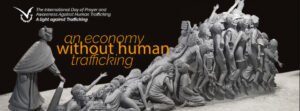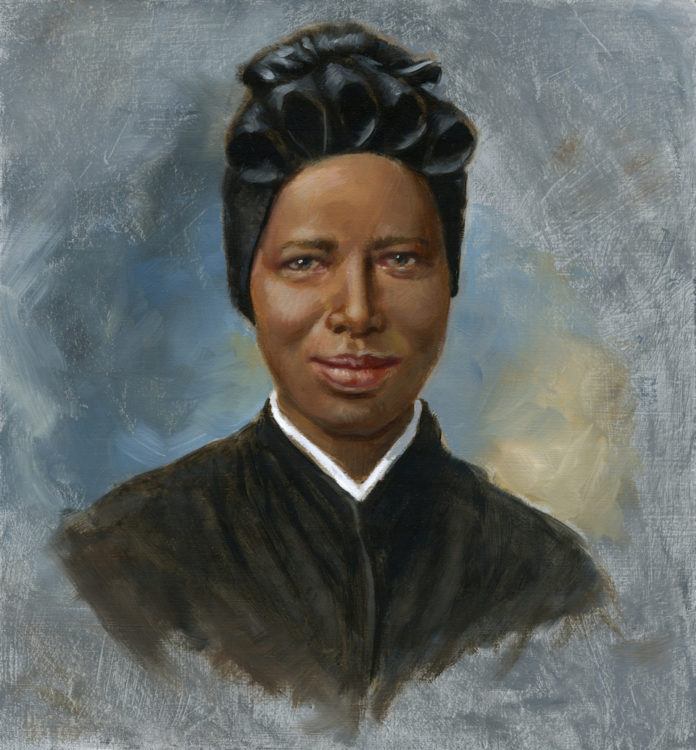 The 8th of February, is the Feast of St Josephine Bakhita, a Sudanese nun, who as a child had the traumatic experience of being a victim of human trafficking.
The 8th of February, is the Feast of St Josephine Bakhita, a Sudanese nun, who as a child had the traumatic experience of being a victim of human trafficking.
“I encourage those who work helping the men, women and children who are enslaved, exploited, abused as instruments of work or pleasure, who are often tortured and mutilated. It is my hope that government leaders may work decisively to remove the causes of this disgraceful scourge, it is a scourge unworthy of society. May each one of us feel committed to being a voice for our brothers and sisters, who have been humiliated in their dignity.“ (Pope Francis: Angelus Prayer February 8, 2015)
Scripture: Luke 4:18-19 “The Spirit of our God is upon me: because the Most High has anointed me to bring good news to those who are poor. God has sent me to proclaim liberty to those who are held captive, recovery of sight to those who are blind, and release to those in prison — to proclaim the year of our God’s favour.”
An economy without human trafficking: This day brings into the spotlight one of the main causes of human trafficking: the dominant economic model of our time, whose limits and contradictions are exacerbated by the Covid-19 pandemic.
Human trafficking is an integral part of “this economy”: victims of trafficking are as “commodities” falling into the mechanisms of a globalization ruled by financial speculation and competition spurred by below-cost pricing. Hence the need for a “structural and global” perspective of human trafficking so as to dismantle those wicked mechanisms that fuel the supply and demand of “people to exploit”, because the very heart of the economy is sick.
“Modern finance, commerce, transportation and communications provide opportunities for the unscrupulous to enter into the system of entrapping and exploiting human persons…. human trafficking has expanded through collaboration among numerous and various perpetrators, making the phenomenon more complex and complicating the assessment of its origins and impact. The crime is easily hidden within current business models.”(Pastoral Orientations on Human Trafficking, #29)
Reflection: A major driver of human trafficking is neoliberalism, the dominant economic model of our time. It relentlessly promotes the assumption that creating wealth for those businesses and individuals who are already well-off will “trickle down” to those in greatest need. Over and over again this has proven to be false. The rich see immense gains in their wealth while those who are poor continue to struggle against ever-greater odds.
Under this model, there are currently more people trafficked and in slavery than ever in history. And the profits derived from the victims of human trafficking are enormous, especially in the sectors of mining, agriculture, hospitality, manufacturing, construction, domestic work, prostitution, and organ transplants. Pope Francis has implored us to “promote a new way of thinking about human beings, life, society and our relationship with nature” (Laudato Si: On Care for Our Common Home, Pope Francis, #215, 2015.)
If we accept this invitation and open ourselves to living more simply and compassionately, and to challenging our economic and political leaders, our economic models may finally begin to eliminate the differences between privilege and poverty. If we choose not to accept this invitation, the liberation of the oppressed that Jesus calls for in Luke’s Gospel will be difficult, if not impossible, to be realized. Source: https://www.talithakum.info/en
| CAN YOU SEE ME? |
|
Can you see me in the things that you purchase, Copyright © 2017, Margaret Scharf OP |
Music: “Can You See Me?”
Please click on the link above to listen to this song written by Sr Margaret Scharf OP. Alternatively you can read the lyrics printed on the right. The song highlights the ways and situations through which people are enslaved by Human Trafficking – situations and ways that occur more frequently now than at any time in human history.
Prayers: On this day we are invited to remember, to pray for and to advocate on behalf of survivors and victims of human trafficking across the world.
We Pray for survivors of slavery, that God guide them to a path down which they might find wholeness and peace. Through the intercession of Saint Josephine Bakhita, patron saint of human trafficking survivors, we pray to the Lord. Lord, hear our prayer.
For all of those children, women and men currently trapped in situations of slavery that God will help to liberate them from their chains. Through the intercession of Saint Peter Claver, patron saint of slaves, we pray to the Lord. Lord, hear our prayer.
For all those vulnerable to being trafficked, especially immigrants and refugees, orphans and runaways that God give them safe passage and safe homes, we pray to the Lord. Lord, hear our prayer.
For all people, that we may come to believe in and act upon our unity as one family and devote ourselves to honoring the inherent dignity of each person. Through the intercession of Mary, we pray to the Lord. Lord, hear our prayer.
https://www.chausa.org/prayers/cha-prayer-library/prayer/february-8-international-day-of-prayer-for-victims-of-human-trafficking-2019
Silent Reflection
What touched your heart
• as you reflected on the sculpture of St. Bakhita rescuing the captives, or
• listened to the Gospel passage and the reflection, or
• absorbed the sentiments of the song?
What commitment can you make to help “proclaim liberty to those who are held captive”?
Closing Prayer
St. Josephine Bakhita, you were sold into slavery as a child and endured untold hardship and suffering. Once liberated from your physical enslavement, you found true redemption in your encounter with Christ and his Church.
St. Bakhita, assist all those who are trapped in a state of slavery; Intercede with God on their behalf so that they will be released from their chains of captivity. Those whom people enslave, let God set free. Provide comfort to survivors of slavery and let them look to you as an example of hope and faith. Help all survivors find healing from their wounds. We ask for your prayers and intercessions for those enslaved among us. Amen.
Resource: For further reading and Reflection TALITHAKUM has produced this comprehensive resource Click Here

